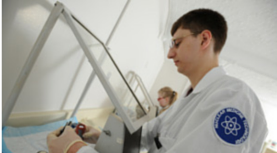Nuclear Medicine Technology
Who are Nuclear Medicine Technologists? 
Nuclear Medicine Technologists are highly skilled health care professionals who use radioactive drugs called radiopharmaceuticals to help diagnose and treat a variety of illnesses. They treat patients of all age groups, from newborns to older adults.
What do Nuclear Medicine Technologists do?
Nuclear Medicine Technologists perform examinations that evaluate how the body functions. There are many diagnostic and therapeutic procedures Nuclear Medicine Technologists are responsible for performing; the most common organs evaluated/treated are:
- Bones
- Heart
- Kidneys
- Liver
- Thyroid
- Brain
- Parathyroids
- Intestinal Tract
- Lymphatics
How do I become a Nuclear Medicine Technologist?
The School of Health Sciences offers a four year Bachelor of Health Science (BHSc) degree program, which includes theory and practice. Students will take core professional development courses with a concentration on nuclear medicine specific skills. The program curriculum offers the necessary competencies to challenge the Canadian Association of Medical Radiation Technologists (CAMRT) professional examination.
Entrance requirements
To be considered for admission High School applicants require grade 12 academic English, Math, Physics and Chemistry with no mark below 70% in each of these courses and an overall minimum average of 75%. Post secondary applicants require a minimum GPA of 2.75 (on a 4.30 scale), with no grade lower than C in prerequisite courses.
One seat in the Nuclear Medicine Technology program is reserved for residents from each of PEI, New Brunswick and Newfoundland. Priority for all other seats will be given to qualified Nova Scotia residents. If seats remain, residents of other maritime provinces followed by residents across Canada will be considered. Admission can be competitive and meeting the minimum entrance requirements does not guarantee admission.
Examples of courses in the program
- Anatomy & Physiology
- Cardiac Imaging
- Radio-pharmacy
- Radiation Biology and Protection
- Pediatric Imaging
- Professional Practice
- Health Care Ethics
- Statistics
- Research Methods
Program outline
| View the course descriptions for Nuclear Medicine Technology » |
|---|
Clinical Rotations
One of the benefits of studying at the School of Health Sciences is the opportunity to do hands-on clinical work. In years 1, 2, and 3, every student spends 6-8 weeks during the summer term completing a clinical practicum in a healthcare setting. In addition, third year students complete multiple clinical education courses directly in the clinical environment to help prepare them for entry to practice.
Most students complete their practicums across Atlantic Canada, while others may travel to locations across the country. Placement opportunities are based on clinical site availability and are subject to change from year to year. Health Sciences students are provided with more information about availability and options before each clinical experience.
Job opportunities
Registered Nuclear Medicine Technologists are qualified to work anywhere in Canada and any country which accepts the CAMRT designation. Working hours and salaries vary from province to province.
Accreditation
Accreditation Canada the program's accrediting body. For more information go to Accreditation Canada's website to view the list of accredited nuclear medicine technology programs.
Certification
Graduates must write national registration exams and meet the clinical requirements set by the Canadian Association of Medical Radiation Technologists (CAMRT) in order to work. Those who pass the exam may use the designation "Registered Technologist in Nuclear Medicine" (RTNM).
Professional associations
The Canadian Association of Medical Radiation Technologists (CAMRT) is the national professional association for Nuclear Medicine Technologists. RTNMs employed in Nova Scotia must be registered with the Nova Scotia College of Medical Imaging and Radiation Therapy Professionals (NSCMIRTP), which is the provincial regulator of public interest.
For more information on Nuclear Medical Technology please visit CAMRT or NSCMIRTP.
